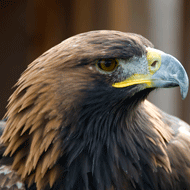
Survey highlights bird’s continuing steady recovery
The population of golden eagles has increased to 508 pairs in Scotland, according to the fourth national golden eagle survey.
Experts say the findings are a rise of 15 per cent since the previous survey in 2003 - which recorded 442 pairs - and indicates recovery of the population towards historic levels.
Carried out during the first six months of 2015, the national survey was co-funded by the RSPB and Scottish Natural Heritage (SNH). It also involved volunteers from the Scottish Raptor Study Group and professional surveyors from the RSPB Centre for Conservation Science.
According to the British Birds Rarities Committee, the findings are significant because the eagle population, having surpassed 500 pairs, now meets the targets identified to define it as having ‘favourable conservation status’ in the UK.
The population increase also highlights the continuing steady recovery in Scotland from extremely low numbers in the mid-nineteenth century, they write.
Commenting on the findings, Duncan Orr-Ewing, head of species and land management at RSPB Scotland, said: “The sight of a golden eagle soaring in the sky above is an awe-inspiring part of our natural heritage, and this increase in numbers of golden eagle pairs is great news.
“Across many parts of Scotland, there’s been a very welcome turnaround in how people respect these magnificent birds, part of a more enlightened public attitude towards birds of prey.
"Increased monitoring and satellite tagging of eagles, as well as stronger sanctions against wildlife crime, may be serving as effective deterrents against illegal activity, therefore helping their population to increase.”
But Mr Ewing adds the continued absence of golden eagles in some areas of eastern Scotland remains ‘a real cause for concern’ and suggests that more work needs to be done.
The survey found that less than one-third of the traditional ‘home ranges’ in the eastern Highlands were occupied by a pair of eagles. In over 30 per cent of this area, no eagles were recorded at all.
Andrew Bachell, SNH’s director of policy and advice commented: “We will continue to look at all the factors which may be limiting numbers, in the hope that we will see further spread of the range and increase in numbers of eagles in the future.”
Golden eagles tend to live in remote areas of Scotland but are often spotted performing their spectacular flight displays in Spring.
The northern Highlands and the central spine of the country saw the greatest increase in eagle numbers between 2003 and 2015. The species also shows sign of recovery in much of the west Highlands and islands.



 The Veterinary Medicines Directorate (VMD) is inviting applications from veterinary students to attend a one-week extramural studies (EMS) placement in July 2026.
The Veterinary Medicines Directorate (VMD) is inviting applications from veterinary students to attend a one-week extramural studies (EMS) placement in July 2026.